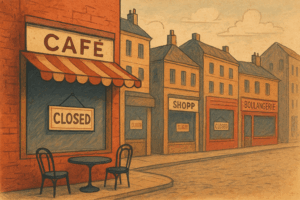REFLECTION – There are markets where prices seem to follow no logic. Not because they are too expensive, contrary to what most people think. But because they are abnormally low. Too low to be sustainable. Too low to be fair. And yet, companies holdThey are just getting by. They survive, if not live. This paradox, which can be observed in many sectors ranging from commerce to services, including catering, but also among freelancers, deserves a name, which I will call here: 👉 the fool's market.
🧩 How did we get here?
Several mechanisms contribute to this invisible but profound imbalance:
🎭 1. Zombie companies
Structures that generate little or no profit, but which survive:
-
thanks to debt,
-
to the persistence of the leader,
-
or to a form of habit/routine and adaptation to the lowering of the standard of living.
This type of situation is typical in the restaurant industry, which is a two-tiered sector: on one side, premium restaurants aimed at a certain elite, and on the other side, all the other restaurants.
And in the market occupied by what I vulgarly call "other restaurants", the consumer makes his choice according to a subtle balance between accessible prices and popularity (on social networks), with a panurgic concentration of customers on certain brands and ephemeral fashion effects.
I am not going to talk here about the exceptions (the brands that manage to charge affordable prices while remaining profitable, and that have good commercial activity), nor about the brands that can afford to impose the "real" price thanks to their premium positioning.
I will focus on all the other players, the everyday traders, the freelancers who are starting out, and all those whose only condition for survival is to align themselves with their neighbors, with prices set haphazardly, often too low to support the costs, the cost of labor, and beyond that, the human cost.
Most people complain about excessively high prices. But in reality, most craftsmen, traders, and some freelancers are actually not profitable or barely profitable, despite their enormous working hours, and the worst part is that they do this for several years.
We could thus speak ofzombie companies, or even zombie marketsThese markets are occupied by players who practice prices that are too low, and this can be explained in several ways:
- new entrants with little experience who impose low prices on the market through ignorance or to grab the best deal;
- the big players who benefit from economies of scale and who push prices down;
- companies that survive for several years thanks to debt.
Companies thus find themselves mired in a commercial strategy imposed by the market, and drag the oldest into bankruptcy, before suffering the same fate themselves, a few years later. This is what I call "zombie inertia," which allows them to survive artificially for several years. This phenomenon distorts the market, and new entrants make the same mistake, until death ensues.
🧮 2. Initially, poor pricing
Many beginners or solo entrepreneurs underestimate:
-
their charges,
-
their working time,
-
future or hidden costs.
The result? Prices that are “acceptable” for the market, but unbearable for them.
🚪 3. Inertia as a prison
Often it is harder to stop than to continue to “eke out a living”:
-
we hope that tomorrow will be better,
-
we are afraid of losing everything,
-
we have employees or a family to support,
- we are already prisoners of financial and human investment.
So we stay. We get exhausted. And we are feeding a market distorted by inertia, which can sometimes allow us to survive for several years, to the detriment of ourselves and our competitors.
💥 But who pays the real price?
Just as there is no such thing as free (and someone who consumes something free over time actually pays for it in another way without being aware of it), a product whose price is abnormally low has a final cost, and there are those who will have to pay sooner or later. Indeed, the reality is that the cost is shifted elsewhere, either geographically (modern slavery) or over time (example of VTCs whose prices were corrected late).
And among the losers in the low-price war, we find, of course, the entrepreneur who sacrifices himself, the employee under pressure whose salary is not up to standard, and the customer whose shopping experience is mediocre.
At the macroeconomic level, the whole society is also living in debt, and ultimately risks losing its sovereignty.
👨💼 The entrepreneur
It is he who pays physically, mentally, emotionally. In fact, it is often he who ends up:
-
ruin,
-
nervously exhausted,
-
Sometimes isolated Or in depression,
-
unable to provide for his family.
We too often romanticize “the courage of the independents,” but we forget to what extent This model can be destructive when unbalancedAnd this is currently, unfortunately, the fate of many traders, craftsmen, and entrepreneurs who are being sacrificed on the altar of excessive debt, the individualization of lifestyles, and the lowering of living standards, particularly in Western Europe.
🧍♂️ Employees and society
When small businesses close, artisans collapse, and independents give up, entire territories are becoming deserted.
And at the same time, populations are becoming poorer, the middle classes are crumbling, and we are hearing more and more:
“Everything is too expensive today.”
But too expensive for whom? And compared to what? Often it is not that it has become too expensive, but that the old prices were not realistic on the one hand, and that there is actually a transfer of wealth on the other hand to other continents that are already light years ahead in terms of innovation and progress. So probably a problem at the political level, with a big lack of concerted planning, and laissez-faire of the market. On the contrary, we have in France the complete opposite, with administrative coercion imposed on businesses, without any long-term economic vision.
So, certainly, in some countries, the accumulation of wealth has come at the cost of several generations of sacrifice (or the plundering of other countries). But there are surely subtle solutions to be found in order to restore people's taste for work, while allowing them to live decently from their work...
But let us return to our low-price war, and to our famous fool's bargain, where inert companies drag one after the other towards bankruptcy, if not at least towards decline.
🌀 The great misunderstanding
At the local level, the consumer—who is an economic agent and therefore seeks to maximize his utility—thinks that the retailer or independent is “exaggerating” with his indecent prices. The entrepreneur, taken to task, thinks that it is he who does not know how to do it, and he often ends up sad and frustrated. Politicians, for their part, believe that “the market will self-regulate,” leaving only useful brands that meet a need. Except that over time, there is less and less supply, less and less innovation, and the proposal is more and more homogeneous, not to say mediocre, due to a lack of resources.
And each one keep playing this fool's game, in a system where everyone loses in the long run.
Moreover, impoverishment and the desertification of city centers not only leads to family and societal dramas, it also raises the question of the society in which we want to live.
By digitalizing everything excessively, and reducing the human being to a single and isolated individual, the question arises of happiness level of the human being. The destruction of the social and economic fabric is likely to create "zombie individuals", without purpose, without passion and obviously devoid of friendly and romantic encounters, which is nevertheless one of the reasons for being human.
Obviously, I'm not saying that we should raise all prices, and plunge consumers further into embarrassment and the impossibility of consuming. I'm just saying that if everything is a priori expensive from the consumers' point of view, they must ask themselves the question in a collegial – and therefore democratic – manner. on the real reasons for the high cost they denounce, and not necessarily blame the traders, who are the first victims of inflation.
Ultimately, rather than entering into a horizontal conflict between consumers and traders, between social classes, between communities or between religions, it is perhaps time to reflect together on the model of society that we want to build for tomorrow, and to roll up our sleeves in order to restore value to work, and thus reclaim our sovereignty, and our know-how, that we have allowed to go abroad.
🧠 Call for reflection
This phenomenon is not inevitable. But it deserves to be recognized. recognizeLet's talk about it. Let's do it. a social issue, not just a management or strategy issue.
👉 Do we really want markets where:
-
Prices are low but people are exhausting themselves making products or providing services of increasingly poor quality?
-
consumers “benefit” in the short term, but lose services in the long term?
-
Are businesses living in fear, debt or illusion?
Can we imagine:
-
fairer prices, which reflect the true value of work?
-
public policies which promote balance, the reduction of burdens, easy access to work rather than the precariousness maintained by a system at the end of its tether?
-
a healthier economic culture, where we value quality, sustainability, and people?
✒️ A fool's bargain
I propose to call this phenomenon: the fool's market. A market characterized by:
👉 A system where everyone thinks they're playing fair,
👉 but where everyone is duped by the very mechanisms of the market.
This fool's game is characterized by entire markets where average profitability is low and natural selection is very slow. This promotes stagnation, prevents innovation, and produces sustainably low but unhealthy prices. This is neither an efficient equilibrium nor a good signal for entrants, much less for investors.
In the meantime, landlords are taking advantage of this inertia to fleece tenants to the bone without showing solidarity with the economic situation, and by telling themselves that there will always be a replacement, and without understanding that in the long term, they too could be affected because they risk no longer finding anyone to rent their premises. They too are taking advantage of the inertia, of which they could soon be the victims.
True courage is not about surviving. It's about building a system where one can live — and live well — from what one offers. Which ultimately comes down to putting on one side the " Work value » at the center of the political spectrum, and on the other side to seek to measure and improve the level of happiness via an indicator such as Gross National Happiness, rather than exclusively economic indicators like GDP. It may seem counterintuitive, but recognized work and happiness often go hand in hand.





